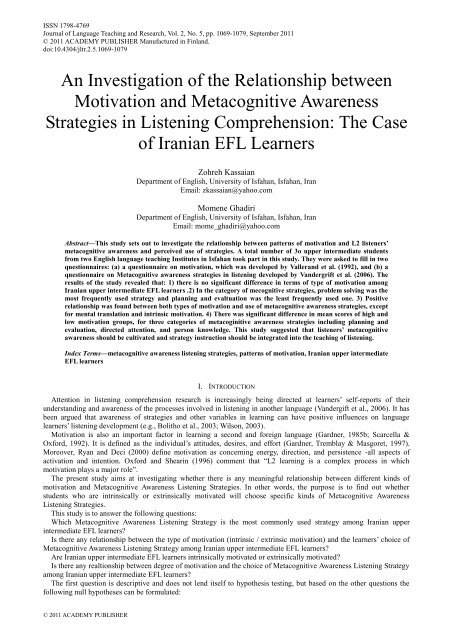Journal of Language Teaching and Research Contents - Academy ...
Journal of Language Teaching and Research Contents - Academy ...
Journal of Language Teaching and Research Contents - Academy ...
You also want an ePaper? Increase the reach of your titles
YUMPU automatically turns print PDFs into web optimized ePapers that Google loves.
ISSN 1798-4769<br />
<strong>Journal</strong> <strong>of</strong> <strong>Language</strong> <strong>Teaching</strong> <strong>and</strong> <strong>Research</strong>, Vol. 2, No. 5, pp. 1069-1079, September 2011<br />
© 2011 ACADEMY PUBLISHER Manufactured in Finl<strong>and</strong>.<br />
doi:10.4304/jltr.2.5.1069-1079<br />
An Investigation <strong>of</strong> the Relationship between<br />
Motivation <strong>and</strong> Metacognitive Awareness<br />
Strategies in Listening Comprehension: The Case<br />
<strong>of</strong> Iranian EFL Learners<br />
© 2011 ACADEMY PUBLISHER<br />
Zohreh Kassaian<br />
Department <strong>of</strong> English, University <strong>of</strong> Isfahan, Isfahan, Iran<br />
Email: zkassaian@yahoo.com<br />
Momene Ghadiri<br />
Department <strong>of</strong> English, University <strong>of</strong> Isfahan, Isfahan, Iran<br />
Email: mome_ghadiri@yahoo.com<br />
Abstract—This study sets out to investigate the relationship between patterns <strong>of</strong> motivation <strong>and</strong> L2 listeners’<br />
metacognitive awareness <strong>and</strong> perceived use <strong>of</strong> strategies. A total number <strong>of</strong> 3o upper intermediate students<br />
from two English language teaching Institutes in Isfahan took part in this study. They were asked to fill in two<br />
questionnaires: (a) a questionnaire on motivation, which was developed by Valler<strong>and</strong> et al. (1992), <strong>and</strong> (b) a<br />
questionnaire on Metacognitive awareness strategies in listening developed by V<strong>and</strong>ergrift et al. (2006). The<br />
results <strong>of</strong> the study revealed that: 1) there is no significant difference in terms <strong>of</strong> type <strong>of</strong> motivation among<br />
Iranian upper intermediate EFL learners .2) In the category <strong>of</strong> mecognitive strategies, problem solving was the<br />
most frequently used strategy <strong>and</strong> planning <strong>and</strong> evaltuation was the least frequently used one. 3) Positive<br />
relationship was found between both types <strong>of</strong> motivation <strong>and</strong> use <strong>of</strong> metacognitive awareness strategies, except<br />
for mental translation <strong>and</strong> intrinsic motivation. 4) There was significant difference in mean scores <strong>of</strong> high <strong>and</strong><br />
low motivation groups, for three categories <strong>of</strong> metacoginitive awareness strategies including planning <strong>and</strong><br />
evaluation, directed attention, <strong>and</strong> person knowledge. This study suggested that listeners’ metacognitive<br />
awareness should be cultivated <strong>and</strong> strategy instruction should be integrated into the teaching <strong>of</strong> listening.<br />
Index Terms—metacognitive awareness listening strategies, patterns <strong>of</strong> motivation, Iranian upper intermediate<br />
EFL learners<br />
I. INTRODUCTION<br />
Attention in listening comprehension research is increasingly being directed at learners’ self-reports <strong>of</strong> their<br />
underst<strong>and</strong>ing <strong>and</strong> awareness <strong>of</strong> the processes involved in listening in another language (V<strong>and</strong>ergift et al., 2006). It has<br />
been argued that awareness <strong>of</strong> strategies <strong>and</strong> other variables in learning can have positive influences on language<br />
learners’ listening development (e.g., Bolitho et al., 2003; Wilson, 2003).<br />
Motivation is also an important factor in learning a second <strong>and</strong> foreign language (Gardner, 1985b; Scarcella &<br />
Oxford, 1992). It is defined as the individual’s attitudes, desires, <strong>and</strong> effort (Gardner, Tremblay & Masgoret, 1997).<br />
Moreover, Ryan <strong>and</strong> Deci (2000) define motivation as concerning energy, direction, <strong>and</strong> persistence -all aspects <strong>of</strong><br />
activation <strong>and</strong> intention. Oxford <strong>and</strong> Shearin (1996) comment that ―L2 learning is a complex process in which<br />
motivation plays a major role‖.<br />
The present study aims at investigating whether there is any meaningful relationship between different kinds <strong>of</strong><br />
motivation <strong>and</strong> Metacognitive Awareness Listening Strategies. In other words, the purpose is to find out whether<br />
students who are intrinsically or extrinsically motivated will choose specific kinds <strong>of</strong> Metacognitive Awareness<br />
Listening Strategies.<br />
This study is to answer the following questions:<br />
Which Metacognitive Awareness Listening Strategy is the most commonly used strategy among Iranian upper<br />
intermediate EFL learners?<br />
Is there any relationship between the type <strong>of</strong> motivation (intrinsic / extrinsic motivation) <strong>and</strong> the learners’ choice <strong>of</strong><br />
Metacognitive Awareness Listening Strategy among Iranian upper intermediate EFL learners?<br />
Are Iranian upper intermediate EFL learners intrinsically motivated or extrinsically motivated?<br />
Is there any realtionship between degree <strong>of</strong> motivation <strong>and</strong> the choice <strong>of</strong> Metacognitive Awareness Listening Strategy<br />
among Iranian upper intermediate EFL learners?<br />
The first question is descriptive <strong>and</strong> does not lend itself to hypothesis testing, but based on the other questions the<br />
following null hypotheses can be formulated:

















